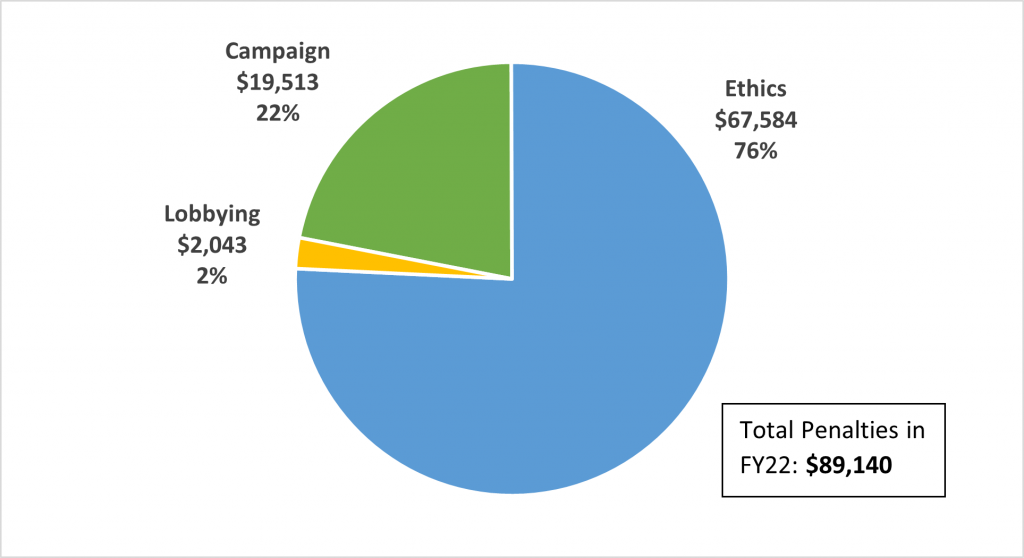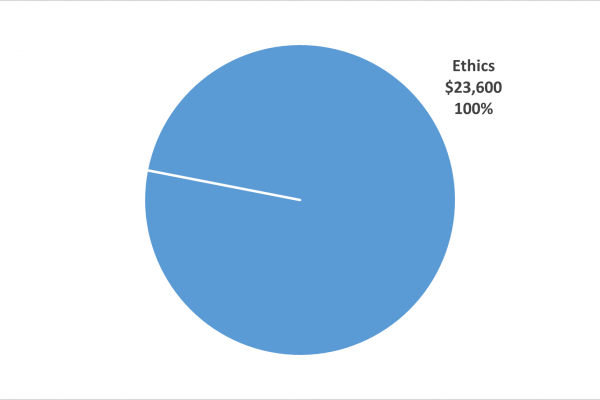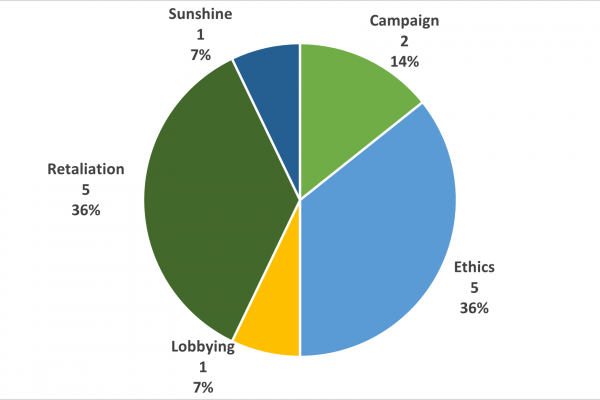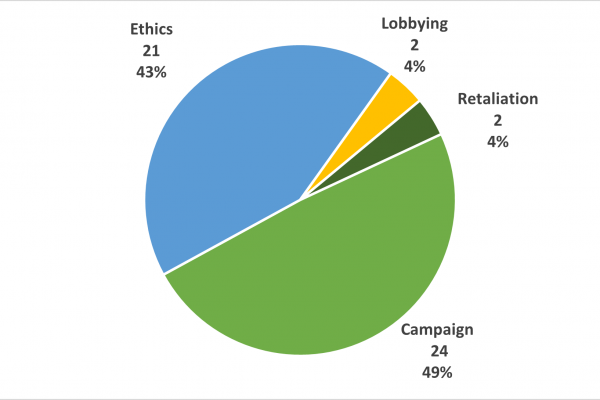November 14, 2022
To: Members of the Ethics Commission
From: Patrick Ford, Director of Enforcement
Subject: Agenda Item 5 – Quarterly Enforcement Report
Summary and Action Requested
This report provides general programmatic updates and data about the cases handled by the Commission’s Enforcement Division.
No action is required by the Commission, as this item is for informational purposes only.
Background
The Commission’s Enforcement Division is responsible for investigating violations of state and local laws relating to campaign finance, lobbying, conflicts of interest, governmental ethics, and whistleblower protection. Enforcement matters are initiated both in response to complaints the Division receives from members of the public and by the Director of Enforcement based on information contained in public records, media reports, and other sources.
All enforcement matters are first examined through the preliminary review process, which assesses whether there is reason to believe that a violation of law within the Commission’s jurisdiction has been committed. Matters will be dismissed in preliminary review if they are outside of the Commission’s jurisdiction, lack sufficient evidence to support further investigation, do not allege violations of the law, pertain to conduct that has already been investigated or resolved, or other similar bases that indicate an investigation would not serve the interest of justice.
Matters that are not dismissed in preliminary review are opened as investigations. The Enforcement Division seeks evidence through the investigation that would indicate whether a violation of the law has been committed. This may include interviewing witnesses, reviewing documents, and issuing subpoenas when necessary. Details about any matter that is opened as an investigation are shared with the City Attorney’s and District Attorney’s offices so that those offices may determine whether they wish to pursue civil or criminal penalties, respectively.
If the Enforcement Division finds evidence indicating that a violation of the law has been committed, it will seek to resolve the matter by securing penalties from the respondent in one of two ways. First, the respondent may enter into a stipulated settlement agreement with the Commission in which the respondent admits to violating the law and agrees to pay a penalty. Alternatively, the Enforcement Division may initiate an administrative hearing process.
Cases Resolved
Fiscal Year 2022
In Fiscal Year 2022 (July 1, 2021 – June 30, 2022), the Enforcement Division concluded a total of 99 enforcement matters. Eleven of these matters (11 percent) resulted in stipulated settlements approved by the Commission In total, these settlements represented penalties of $89,140. The penalties are summarized in Chart 1 below and are categorized by program area.
Chart 1 – Penalties Assessed in FY22 by Program Area

Fiscal Year 2023
So far in Fiscal Year 2023 (July 1 – November 10, 2022), the Enforcement Division has concluded a total of 81 enforcement matters. Two of these matters (2.5 percent) resulted in stipulated settlements approved by the Commission. In total, these settlements represented penalties of $23,600. The penalties are summarized in Chart 2 below and are categorized by program area.
Chart 2 – Penalties Assessed in FY23 by Program Area

Cases In Progress
So far in FY23, 46 enforcement matters have been initiated. The majority of these (36) began from complaints that the Commission receives from the public, but this also includes 10 matters that the Division initiated based on media reports, observations in public disclosures, independent research, and interactions with regulated persons. Some of these matters initiated in FY23 remain in progress while others have already been resolved.
In total, 103 matters are currently in progress, including matters that were initiated during FY22 and matters that were initiated in prior fiscal years. Of these matters, 14 are in preliminary review, and 49 are open investigations. At the time of the last Enforcement report in May, 55 matters were in preliminary review, and 48 were open as investigations. This reflects the Division’s ongoing focus on completing all preliminary reviews within three months.
The current cases in progress are broken down by program area in Charts 3 and 4 below.
Chart 3 – Matters in Preliminary Review by Program Area

Chart 4 – Open Investigations by Program Area

Seven of the 49 investigations (14%) are currently more than two years old. This is down from the time of the last Enforcement report in May, when 12 of 48 investigations (25%) were more than two years old, and from October 2021, when 15 of 47 investigations (32%) were more than two years old. This reduction reflects the Division’s ongoing focus to resolve older cases and to timely address newer cases before two years has elapsed. The Division continues to work toward the goal of resolving all cases within two years, in accordance with the Case Closure Plan. However, there are a variety of reasons a matter might not be resolved within two years, including respondents pursuing all available due process rights, respondents or other sources not readily releasing evidence, complex factual investigation work, coordination with another law enforcement agency, and investigative holds requested by the District Attorney or City Attorney.
Current Initiatives
The Division is currently pursuing a number of initiatives that will continue to build the Commission’s enforcement capacity. This work is done in order to better conduct thorough, high-quality investigative work, develop more high-impact cases, and achieve more efficient case resolutions. This section summarizes some of the primary initiatives currently underway.
Developing Investigator Specializations and Proactive Work
A major focus of the Division’s work this year has been developing specializations within the team. This is true of both program areas and functions. Investigators have developed expertise in the specific areas of law administered by the Commission through case work and training. Thanks to the expanded number of investigators, cases can now be assigned in many instances to an investigator that has handled similar cases in the past and who has particular expertise in the laws at issue. These subject matter specializations also support increased proactive enforcement work, which is when investigators initiate enforcement matters without receiving a complaint. The Charter provides for this proactive work to take place, and it is an important way to ensure that violations that are apparent from disclosure filings, public records, or media reports are investigated appropriately.
Simultaneously, the Division is working toward specialized functions within the Division. Instead of one investigator being responsible for a case from beginning to end, investigators now team up on cases, with one investigator leading the investigative work and one leading the steps involved in pursuing liability in the case, such as settlement negotiations, probable cause, and hearings on the merits. The investigators who have law enforcement and auditing backgrounds leverage their skills by leading the investigative stage, while the investigators who are also attorneys are able to leverage their skills by specializing in seeking liability for violations that are discovered through the investigation. This arrangement has resulted in better utilization of skills, stronger collaboration, and more effective case resolutions.
Refining and Documenting Investigative Protocols
Another major focus this year has been refining and documenting the protocols followed by the Division when investigating cases. Although the Division has always followed protocols, the process of refining and documenting them more thoroughly has allowed the newly expanded team to effectively collaborate and conduct their work in a standardized way. Common investigative documents are created based on templates, and basic protocols for preliminary review, investigation, and other processes are regularly updated as the Division’s work evolves. These confidential investigative documents also serve as helpful resources for onboarding new investigators. The Division is also developing investigative resources that are specific to particular violations that are commonly investigated by the Commission. These resources will identify the elements of violations and the common types of evidence used to substantiate them.
Hiring
The Commission hired three senior investigators to join the Division this year. Eamonn Wilson was promoted from investigator to senior investigator, Ashley Mockett and Zachary D’Amico were hired as senior investigators. Onboarding, training, and developing specializations for new investigators has been a significant focus for the Division this year.
Unfortunately, Ms. Mockett ended her employment with the Commission in October. Between this vacancy and Mr. Wilson’s promotion, there are two vacancies in the Division: one senior investigator (1823) and one investigator (1822). Filing these positions is a top priority, and hiring is targeted to begin in the third quarter of FY23.
Development of New Case Management System
The Division has been collaborating with the Commission’s Electronic Disclosure and Data Analysis (EDDA) Division to develop a new case management system that the Division will use to administer enforcement matters. The new system will provide for faster and more thorough communication between investigators who are collaborating on a case and improved document management. Deployment of the system is planned for the end of this quarter.